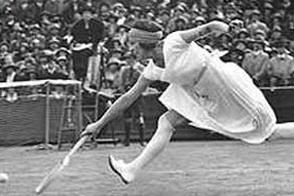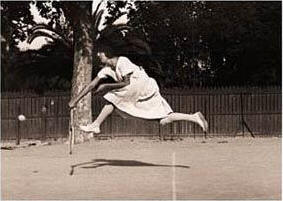|

Suzanne Lenglen 1899-1938
Suzanne Lenglen was French and knew how to
handle a racket
as much as she knew how to pick the right socks (see photo above.)
Wee Suzanne was born on May 24, 1899, at Nice, France.
Her father,
Charles "Papa" Lenglen,
taught her how to play and how to value the mighty buck.
Sports Illustrated (June 27, 2005, issue) named him as
one of "the earliest pushy parents we know." Suzanne's
mother was Anais Lenglen.
But it worked.
Suzanne was a
heck of an athlete and won Wimbledon six times. People admired the
extra oomph she had in her play. Mademoiselle Lenglen was not shy with her wardrobe either.
What she lacked in beauty was more than compensated by charm,
glamour, and eccentricity.
Again citing Sports Illustrated, which ran its article
Reluctant Queens Of The Court in their
 May 7, 1962, issue, and their
May 14, 1962, issue,
May 7, 1962, issue, and their
May 14, 1962, issue,
Suzanne played with craft and the grace of a
dancer; she covered the tennis court with an
effortless glide.
And if you like tennis, you should really read
the article in its entirety.
Still hesitant?
Here is another
excerpt. We are reading about the long
anticipated, and what later turned out to be the
only, match between the two top women tennis
players of their day,
Helen Wills (later Helen Moody) of
California, and Suzanne Lenglen.
It's February 16,
1926, we are at the Carlton Club tournament in
Cannes, France. Lenglen won the first set 6-3.
In the
second set Helen began anticipating some of
Suzanne's cannily directed shots and ran to
a 3-1 lead. Her strategy of seeking to
exhaust her older opponent, who was
something of a hypochondriac, appeared on
the point of fruition. Suzanne, never one to
conceal either her emotions or her real or
imagined pains, began clutching dramatically
at the region of her heart.
When
she found herself down 3-1, she strode to
the sidelines and helped herself to a stiff
shot of cognac. Stimulated, Suzanne evened
the set at 3 all, but soon fell behind.
Helen, ahead by one game, smashed a hard
forehand down the line that the crowd,
partisan though it was, thought to be good.
But the linesman, Cyril Tolley, a noted
British golfer, ruled the ball out. Suzanne
rallied, and at 6-5 reached match point.
Then an incident occurred that some were
inclined to compare with the false armistice
of November 7, 1918. Helen hit a ball deep,
and someone in the stands yelled "Out!" The
players and the crowd assumed the call was
official.
Spectators swarmed over the court and
photographers posed the two girls at the
net. But the officials ruled that the ball
had been good. Helen then won the game and
the set stood at 6-6. Such an incident
usually left the emotional Suzanne seething.
A crisis of nerves appeared in prospect. But
she seemed unperturbed and ran out the set
8-6, and with it the match.

Suzanne, here at Wimbledon for a change,
stumbling upon Queen Mary.
Suzanne Lenglen's wins included:
Wimbledon - singles 1919, 1920, 1921,
1922, 1923, 1925
Wimbledon - doubles 1919, 1920, 1921, 1922, 1923, 1925
Wimbledon - mixed doubles 1920, 1922, 1925
French Open - singles 1920, 1921, 1922, 1923, 1925, 1926
French Open - doubles 1925, 1926
French Open - mixed doubles 1925, 1926
In the 1919
Wimbledon
"women's
final, Suzanne Lenglen beat Dorothea Lambert
Chambers 10-8, 4-6, 9-7. The 40 year-old
Lambert Chambers nearly grabbed her eighth
title in this generational gasp. But Lenglen,
20, fortified by third-set brandies,
couldn't be denied the first of her six
championships."
Bud Collins,
tennis historian
In 1920 at the Olympic Games in Antwerp, Belgium, Suzanne pocketed gold medals in singles and mixed doubles.

SUZANNE PLAYING IN NICE, FRANCE, 1921
Suzanne Lenglen died on July 4, 1938,
at Paris of pernicious anemia. Pernicious anemia is a disease in
which the red blood cells are abnormally formed, due to an inability
to absorb vitamin B12.
RIP Suzanne, and let's hear a final quote from Sports Illustrated,
the
 October 16, 1991, issue:
October 16, 1991, issue:
Rice and his fellow Americans were mostly
homers. The exception was Heywood Broun, a
beefy, Brooklyn-born columnist for the New
York World. Lenglen was Broun's kind of
woman: She smoked, she drank, she kept her
training to a minimum, she was a nervous
wreck.
"She moves through one of the most exacting
of all strenuous games and remains in
appearance morbid," he wrote.
"Suzanne is the finest of all
champions...for she wins and wins and still
avoids the reproach of being an ideal or a
good example to anyone."
Here is more on
 Suzanne Lenglen provided by the official Wimbledon site.
Suzanne Lenglen provided by the official Wimbledon site.
More History
|